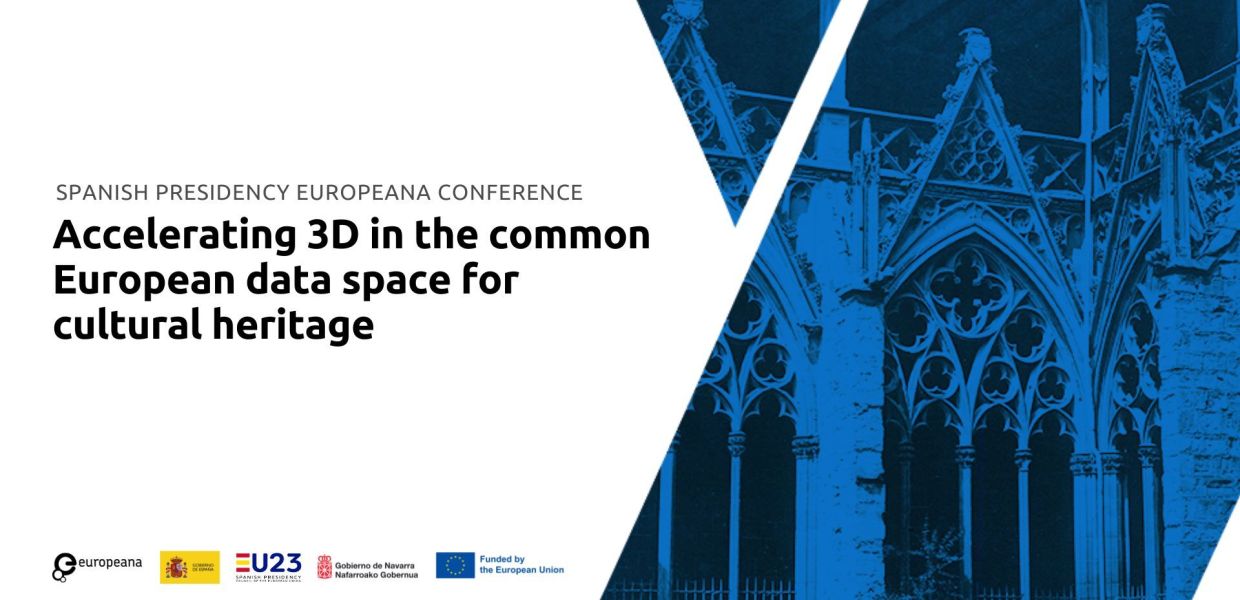The context: the Spanish Presidency, 3D and the data space
In the second half of 2023, Spain assumed the presidency of the Council of the European Union, with a significant focus on advancing culture and cultural heritage as global public good, a core principle shared by the Europeana Foundation. EU Ministers of Culture, under the Spanish Presidency, adopted the 'Cáceres Declaration' as the commitment of all 27 Member States to recognise culture as an essential and global public good at the highest political level.
The 2021 European Commission Recommendation on a common European data space for cultural heritage emphasises the need for intensified digitisation efforts, particularly focusing on 3D, to make cultural content more accessible and reusable through Europeana.eu and the data space.
In this context, the Spanish Presidency Europeana conference ‘Accelerating 3D in the common European data space for cultural heritage: Building Capacity for 3D’ was held on 17 October 2023 in Pamplona and online. The event aimed to advance the agenda for 3D, and was organised by the Spanish Ministry of Culture and Sport and the Europeana Foundation, thanks to the hospitality of the Government of Navarra and under the auspices of the Spanish Presidency. served as a nexus for various actors and stakeholders to exchange knowledge, share experiences, and explore opportunities for collaboration.
The conference was organised in the framework of, and as support to the Twin it! campaign, further amplifying its importance, impact and reach. Under Twin it!, the Ministries of Culture of the European Union Member States are invited to liaise with their national cultural institutions to submit one 3D digitised heritage asset to the common European data space for cultural heritage, deployed by the Europeana Initiative.
3D in focus
Aligned with the European Year of Skills (EYS) 2023, the conference aimed to enhance 3D digitisation skills and workflows. Through keynote speeches, panel discussions, workshops, and interactive experiences, participants delved into best practices for leveraging 3D technologies to advance cultural heritage preservation, access, and reuse.
Addressing critical considerations for capacity-building in 3D digitisation, the conference explored various facets, including:
Technological infrastructure: Discussing hardware, software tools, and network requirements essential for effective 3D digitisation.
Training and skills development: emphasising the importance of training on scanning and modelling techniques, as well as metadata creation.
Financial resources: advocating for adequate funding to procure equipment, facilitate training, and support digitisation projects.
Quality and standards: establishing quality benchmarks and protocols for ensuring the longevity and sustainability of 3D digital assets.
Long-term strategies: developing comprehensive strategies and institutional policies to guide 3D digitisation initiatives.
Collaborations and partnerships: encouraging partnerships with technology companies and cultural heritage institutions to foster knowledge sharing and resource pooling.
Legal considerations: addressing copyright and intellectual property rights issues while advocating for open access to 3D cultural heritage data.
User engagement and education: integrating 3D digital content into educational programs, cultural tourism initiatives and exhibitions to enhance public engagement and research opportunities.
The insights and reflections shared by speakers and participants underlined the collective efforts required to enhance 3D capabilities and achieve targets for 3D content in the cultural heritage data space.
Find out more
Read the conference report for a full description of the outcomes of the event and recommendations about 3D digitisation, or find out more about the Twin it! campaign.



